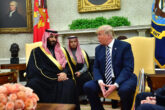January 26, 2021
China’s Digital Currency
Adding Financial Data to Digital Authoritarianism
Executive Summary
China is pushing aggressively to be a global leader in financial technology. Over the last several years, use of mobile payment platforms has exploded in China while cash transactions have declined. At the same time, global interest in the development of central bank digital currencies (CBDCs) has also risen, with dozens of central banks now researching ways to offer digital versions of their fiat currency to ordinary citizens. The People’s Bank of China (PBOC) is leading in these efforts, aiming to release a central bank digital currency of its own. This CBDC system, which the Chinese government calls Digital Currency/ Electronic Payment (DCEP), will likely enable the Chinese Communist Party (CCP) to strengthen its digital authoritarianism domestically and export its influence and standard-setting abroad. By eliminating some of the previous constraints on government data collection of private citizens’ transactions, DCEP represents a significant risk to the long-held standards of financial privacy upheld in free societies.
The PBOC’s DCEP strategy is motivated by a number of factors. The dominance of private mobile payment firms in China has given such companies an outsized role in retail commerce, making them indispensable to the economy. The PBOC is seeking a digital currency to harness the market share and technological innovation of private financial firms and to gain better access to information about the financial activities of Chinese consumers. DCEP is also part of China’s geopolitical ambitions, and CCP officials frame the progress of DCEP as similar to advancements in other strategically important emerging technologies, such as artificial intelligence and robotics. DCEP’s development also comes against a backdrop of China’s broader push to internationalize the renminbi.
Few technical details about DCEP are publicly confirmed. The PBOC has indicated that DCEP will have a two-tier structure, with the PBOC managing the back-end infrastructure while employing banks and other companies to aid in distribution to the public. It is clear that, despite much initial PBOC discussion about distributed ledger infrastructure, DCEP will not use blockchain as part of its design. DCEP is also likely to allow for some basic programmability involving its transactions and to offer users the opportunity to access the currency via software wallets. Despite some official statements and reporting about these general features, much of the precise operational architecture is still being worked out.
China is pushing aggressively to be a global leader in financial technology.
It is also clear that the Chinese government hopes to leverage DCEP for the CCP’s domestic political agenda. Whereas PBOC officials have indicated that they will harness huge amounts of DCEP data to enhance monetary policy and monitor for illegal activity, officials higher in the Chinese government have stressed DCEP’s value as a tool for enforcing party discipline. PBOC officials also have said that DCEP will have “controllable anonymity,” allowing the central bank to see all of the transactions taking place while maintaining privacy among transacting parties. However, the system will also enable the CCP to exercise greater control over private transactions, as well as to wield punitive power over Chinese citizens in tandem with the social credit system. Additionally, although a number of PBOC officials hope DCEP will help drive internationalization of the renminbi, DCEP is unlikely to do so by itself in the short term.
The PBOC is in position to launch the largest digital currency project of any major economy. DCEP pilot tests have been underway since mid-2020 in several localities, and a number of state-owned banks and technology firms are building interfaces and distribution systems for the platform. The PBOC hopes to make DCEP available for wider use around the time of the 2022 Winter Olympics, which will be hosted in Beijing.
With China’s quick progress in developing and testing the system, U.S. policymakers must closely track DCEP’s development and act strategically to address its potential to further the CCP’s coercive power and its influence in the evolving global financial system. Although DCEP is not likely to displace the U.S. dollar as a global reserve currency, it may serve as a model and standard-bearer for other countries to emulate. The United States might not necessarily need to create its own CBDC, but it must adapt to the quickly changing payments space, understand the geopolitical implications of this technology, influence its development, counter the DCEP’s threats to political and economic liberty, and ensure that financial technology innovation does not further China’s digital authoritarianism.
Download the full report.
More from CNAS
-
A New Arsenal for Competition
Executive Summary The United States and China have long used coercive economic measures to advance both economic and foreign policy objectives. In recent years, however, both ...
By Elizabeth Rosenberg, Peter Harrell & Ashley Feng
-
Game Over?
The trade wargame suggests that sustained high tariffs could create leverage and urgency to spur action toward a productive restructuring of the international trade system....
By Emily Kilcrease & Geoffrey Gertz
-
Middle East Security / Energy, Economics & Security
Trump Inks $600 Bn Deal In Saudi Arabia | Musk, Blackrock CEO Flank Trump In Gulf VisitIn today's episode of India Global, U.S. President Donald Trump secured a $600 billion commitment from Saudi Arabia on Tuesday to invest in the United States. NDTV's Gaurie Dw...
By Daniel Silverberg
-
Energy, Economics & Security / Technology & National Security
Tariffs and Tech: An Uncertain RecipeHigher tariffs could prompt American cloud companies to shift more of their capital investments abroad....
By Pablo Chavez






